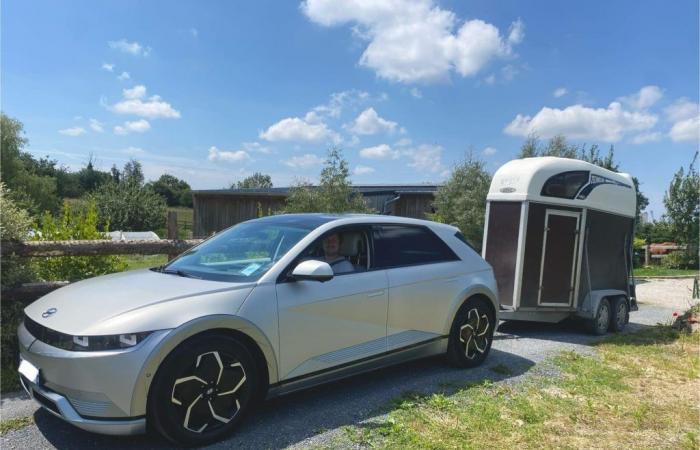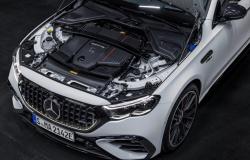It is not always easy to combine ecological awareness with real everyday needs. Challenges can sometimes get in the way (no pun intended). Clean Automotive had the opportunity to talk with Maxime, a physiotherapist in the Manche department. This 36-year-old father purchased a Hyundai Ioniq 5, an electric model capable of meeting all of his needs, including towing a van.
Switching to electric to keep up with current challenges
Maxime lives in Saint-Lô, a prefectural city where he works as a physiotherapist. As part of his professional activity, he is required to take the road every day. He works 30 km from his home and from time to time makes direct visits to patients. He therefore does not need a vehicle with a long range, even if an electric Fiat 500 might be a bit tight. Between his job and his personal travel, Maxime travels around 30,000 km per year.
In 2022, after several years of driving a Skoda Karoq diesel, he had a brainwave. The healthcare professional wanted to put his ecological conscience into practice in everyday life and decided to buy an electric car. He needed a model big enough to accommodate three people and a large dog, with a decent range, a decent charging speed and, above all, with the ability to tow heavy loads. A few years ago, there weren’t that many electric cars capable of towing.
While the torque required to tow has never been a problem, it is rather the question of weight that has slowed down brands. Electric cars are heavier than thermal cars and manufacturers have therefore had to reinforce the chassis of their models to be able to support a high weight, while protecting the battery from impacts. For purely economic reasons, some manufacturers initially chose not to develop a towing capacity. But times have changed.
Read also
Testimony – This doctor visits his patients in a Tesla Model 3 Performance
The Hyundai Ioniq 5, an ideal model for this physiotherapist
Maxime quickly identified the Hyundai Ioniq 5 as a vehicle capable of meeting all of his needs. To further reduce his ecological impact, he decided to buy this car: ” rather than leasing and changing models every year, I thought it would be a good idea to buy with the aim of keeping the vehicle for several years. Or even go all the way “With a five-year unlimited mileage warranty and eight years on the battery, the physiotherapist is confident.
In an ideal world, he says he could even reach 500,000 km with his Ioniq 5. Other drivers of electric cars are very close to passing this milestone. This is for example the case of Jean, a Parisian VTC driver with his Kia e-Niro. Without any hesitation with another model, Maxime therefore chose a Hyundai Ioniq 5 Propulsion in Executive finish with a 218 hp engine, 350 Nm of torque and a battery of 73 kWh. He tells me that he did not opt for all-wheel drive. because the autonomy was reduced ».
Overall, he is very satisfied with his electric car. According to him, the Ioniq 5 is perfectly suited to his daily life. He explains to me that even when he goes on vacation with his family, “ Charging on the highway has no impact on the duration of our journeys “. With his young son, Maxime stops, whatever happens, quite regularly. With a 10 to 80% in 18 minutes, the physiotherapist does not see the difference with his old diesel car. He used to take 25 to 30 minute breaks on the motorway.
To recharge his Ioniq 5 at home, he simply installed a Green’up socket. “ This allows me to regain between 35 and 40% in one night, and that’s enough. “. No need for more with a car capable of (theoretically) doing 481 km WLTP on a single charge. In reality, Maxime is more around 350 km in mixed use. With its Tempo plan, the cost of recharging is almost painless. Moreover, he confides to me that he did “ 700 euros savings » since switching to this new energy package.
An electric car capable of towing
Equipped with a hitch, the model has a towing capacity of 1,600 kg. This is therefore more than enough for Maxime. Once loaded, his van never exceeds 1,200 kg. The Norman physiotherapist regularly transports his horse or sheep. The difference in consumption is, however, quite impressive. If his Ioniq 5 usually offers an average of around 17 kWh/100 km, with the van, it’s not at all the same story. In general, I’m around 26 kWh/100 km with the van and the horse. ».
That’s almost 55% more. But this is not shocking for Maxime. He would like to point out that with a thermal car, “ the difference is also of the same order “. It’s hard to say whether the difference between an electric and thermal car is exactly proportional, but it’s certainly not very far. With his van and his horse, Maxime can therefore travel around 200 km (mixed use). As he only travels in this configuration on short journeys, he believes that it is more than enough.
What is the problem with the 12 V battery?
Despite a very satisfactory overall experience, Maxime encountered a small difficulty which he wanted to explain to me in detail. He had to deal with repeated breakdowns due to a malfunction in the 12 V battery. In two years, he found himself broken down four times because the battery had discharged without warning. While the car’s main battery is properly charged, this fault prevents it from starting. Each time, he was “ Safe » by the photovoltaic panels of his Ioniq 5 and was able to leave.
But he admits to me that it is always ” a good bit of stress “. He obviously went to his dealership to try to understand where the problem was coming from. Hyundai immediately changed the battery in question, as well as the electric charging hatch, thinking that the fault could come from there. Despite this passage through the workshop, Maxime’s Ioniq 5 still has whims at this level. The parent company has probably identified the problem. In a video published in 2023, an American YouTuber, said he was contacted by a Hyundai representative.
Read also
Hyundai and Kia: major recall for electric cars
The reason given by the brand would be “ Abusive solicitation from third-party applications “. To put it simply, these applications request information from the Hyundai Ioniq 5 too frequently. Each time this happens, the vehicle consumes energy. Some models receive up to 5,000 requests per day. The manufacturer claims to have limited the number of requests to 20 per day and that the problem has been resolved. But this is probably not the case with our Norman.
Maxime has an appointment in July for the 60,000 km service, he will take the opportunity to bring up the subject again and try to find a solution. Like all the other owners of the model, he also received a reminder letter for the ICCU. As I finish this article, the physiotherapist from Saint-Lois has just broken down because of the ICCU. His Ioniq 5 had to be towed to the garage. Despite this little hiccup, he remains totally convinced. On the way to 500,000 km.






